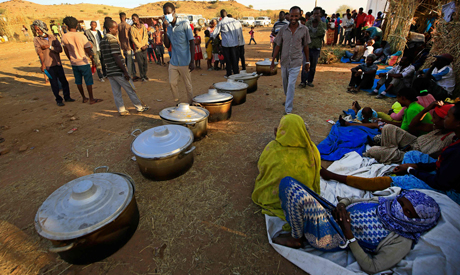Date: Tuesday, 24 November 2020

With fears mounting that conflict in Ethiopia will turn into a civil war, neighbouring countries are increasingly worried the war in Ethiopia may open another door to hell that will result in further deterioration of their complex conditions.
A case in point is Sudan, which hosts more than a million refugees from its neighbouring countries. The figures were calculated even before the conflict in Ethiopia ensued between the Abiy Ahmed government and his rivals the Tigrayans who were ousted from the helm upon his ascension to power in 2018.
Sudan is in a dark abyss which led to the overthrow of Omar Al-Bashir from office after 30 years of rule. The Sudanese Revolution, much like in many countries, didn’t defuse the crisis. The current transitional government led by Abdullah Hamdok announced “an economic state of emergency” to save the national currency from collapsing and to counter the shortage in basic commodities such as bread, fuel and medicine.
The United Nations expects Ethiopians fleeing the conflict in the northern Ethiopian region of Tigray to Sudan may well reach 200,000, which means that Khartoum will bear more problems that its fragile economic and political conditions can’t afford. Some 30,000 Tigrayans have already fled their homes to Um Rakouba, east Sudan, the UN said.
Khartoum fears the Ethiopian Civil War will spread to Amhara, leading its refugees to flee to east Sudan. In addition to increasing the economic burden, Sudanese stability may well be compromised if clashes ensue between Ethiopian ethnicities on Sudanese lands.
Clashes broke out in Ethiopia earlier this month when Prime Minister Ahmed ordered his forces to head to Tigray to confront what he called “the criminal military council”, referencing the Tigray People’s Liberation Front (TPLF) which has been at the helm of power in Ethiopia since 1991 until Ahmed ascended to lead the government. As soon as Ahmed, who hails from the Protestant Oromo ethnic group, took office he fired Tigrayans in leading positions and tried tens of Tigray officials for corruption.
For three decades the Tigrayans had been controlling security, leading army positions, and high posts in Ethiopia. They accused Ahmed of marginalising the ethnic group, increasing tensions in the country divided ethnically and religiously. In an attempt to bridge such divisions, Ahmed disbanded the ruling People’s Revolutionary Democratic Front, made up of several ethnic parties representing the components of the Ethiopian people. Instead, he formed the Prosperity Party, which the TPLF refused to join.
The conflict flared when the Tigray leadership rejected the central government’s decision to put off general elections — slated for September 2020 — indefinitely, citing fears of the spread of coronavirus. Many observers dismissed the government’s claim, because even before the spread of the pandemic estimates had pointed out there was a possibility the Ethiopian state would “disintegrate” if general elections were held.
The Tigray region held a referendum which the Addis Ababa government was ruled as “illegal”. The TPLF said Ahmed’s stay in power was “illegitimate”.
The Tigrayans haven’t demanded independence from Ethiopia, although this month’s events may lead to this result.
Ahmed has refused African mediation in the crisis, claiming it is “an internal affair to apply the law”. The federal government in Addis Ababa granted the Tigrayans 72 hours to surrender unconditionally, announcing it will show no mercy if its offer is rejected. The army leadership in Addis Ababa announced it was forcefully heading towards Mekelle, the Tigrayan capital, to surround it with tanks. The region may be shelled, the army said, warning the half million inhabitants in the capital of the repercussions.
Alex de Waal, a British researcher in Horn of Africa affairs, opined that quelling the rebellion in Tigray will not be easy or fast. Other ethnicities may rebel also, he said.
Sudan may have a say in determining the course of the conflict in Ethiopia, having to shoulder the burden of tens of thousands of Ethiopian refugees. Moreover, Sudan has been having decades-long border conflicts with Ethiopia over Al-Fashqa.
Sudan has not been responsive of late to Ethiopia’s procrastination in negotiations over the Grand Ethiopian Renaissance Dam dispute. Khartoum refused to take part in the last round of talks over the dam.
These conditions may drive Sudan to stand alongside the Tigray against Addis Ababa. In this case, however, Sudanese opposition groups that signed fragile peace deals with the Khartoum transitional government will support Ethiopia.
Consequently, there will likely be a bigger, open conflict between Sudan, on the one side, and Ethiopia and Eritrea on the other that are both allied against the TPLF.
Tigray had accused Eritrea of supporting the Ethiopian government in the current war. Asmara refuted the charges.
For decades, Khartoum has been involved in Ethiopian and Eritrean affairs. It supported the Tigray and the Democratic Front for the Liberation of Eritrea to free Asmara from the Derg regime under the leadership of Mengistu Haile Mariam in the 1980s.
Khartoum remained a key supporter of Eritrea’s independence until the early 1990s when rifts broke after Khartoum adopted the Islamist ideology of the Muslim Brotherhood and Eritrea harboured Sudanese oppositionists and their families.
The more significant question, however, is who will support Khartoum if it gets into hot water amid the Ethiopian conflict, especially with its deteriorated economic and political conditions.